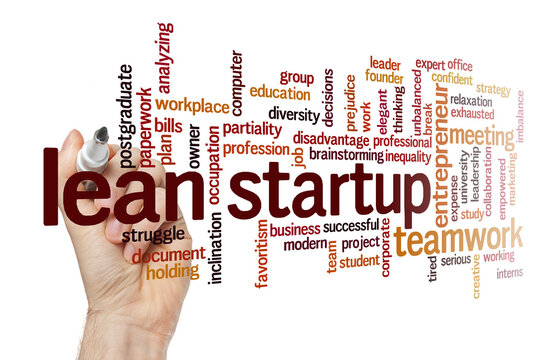The Lean Startup methodology
The Lean Startup methodology represents a paradigm shift in the traditional approaches to product development and company establishment, placing a significant emphasis on market needs and consumer insights. Coined in the early 2000s and later formalized as a distinct technique around 2010, the Lean Startup approach was championed by prominent Silicon Valley entrepreneurs, Steve Blank and Eric Ries. It stands in direct contrast to the conventional wisdom of developing products in a clandestine "stealth mode." Instead, it encourages entrepreneurs to openly evaluate potential business models and test concepts in the early stages of a venture.

The primary objective of the Lean Startup methodology is to eliminate inefficiencies in the initial phases of a company's development, thereby increasing the likelihood of long-term success. Unlike the traditional model that often necessitates large financing, detailed business plans, and flawless products, the Lean Startup process enables early-stage ventures to achieve profitability through a dynamic and responsive development process. One of the key benefits of this approach is its ability to achieve success without substantial initial investments, comprehensive business plans, or flawless product development.
The Lean Startup methodology encourages prospective business owners to launch their ventures by thoroughly evaluating potential business models and testing their hypotheses. Subsequently, feedback from prospective clients is utilized to adapt and iterate on initial plans. The emphasis is on learning from experience, responding to customer feedback, and making continuous adjustments.
The Lean Startup principles are guided by five key tenets:
- Entrepreneurs are Everywhere: The Lean Startup concept applies to any individual who owns and operates a startup, irrespective of its size or nature. It is a solution for anyone eager to minimize resource and time usage.
- Entrepreneurship is Management: A startup is seen as an institution, requiring specialized management. Although this management may not be as protocol-based as that of established firms, it is essential to react to challenges, manage investors, and encourage staff exploration.
- Validated Learning: Rather than merely producing goods or servicing clients, startups aim to establish sustainable businesses. Validated learning involves scientific tests that confirm learning through the testing of each part of an entrepreneur's perception.
- Innovation Accounting: Startups must make data-driven decisions to build a tenable firm. This involves objectively assessing processes, setting milestones, and prioritizing tasks. Lean ventures document experiments and analyses to determine what works.
- Build-Measure-Learn: Lean entrepreneurs produce a Minimum Viable Product (MVP), the simplest product that works, and test it with users. This iterative process involves building, measuring, and learning, with adjustments made based on feedback.
The Lean Startup approach involves a loop of building an MVP, testing it with customers, analyzing feedback, and making adjustments. This iterative cycle allows for quick and cost-effective product development, ensuring that the final product aligns with customer desires.
Examples of successful Lean Startups further illustrate the effectiveness of this methodology. Dropbox, a renowned cloud data storage provider, initially assessed product demand through a 3-minute screencast, guiding subsequent innovations based on customer feedback. Forbes underscores the importance of a lean approach for startup survival, emphasizing learning through experience, feedback, and iteration.
In contrast to design thinking, which focuses on idea enhancement, the Lean Startup methodology transforms ideas into functional business models. The iterative and customer-centric approach of Lean Startup facilitates the development of high-quality products efficiently.
Frequently Asked Questions shed light on the transformative nature of Lean Startup, highlighting its departure from conventional entrepreneurial thinking. It challenges assumptions about product development, encouraging a focus on customer demand, rapid iterations, and resource efficiency. The Lean Startup methodology, with its emphasis on validated learning and continuous adaptation, presents a compelling framework for the contemporary entrepreneur seeking success in a dynamic and competitive business landscape.
RELATED POST
- How to Transition from Startup to Scaleup
- How to Reduce Customer Acquisition Cost for Your Startup?
- Startups in Ho Chi Minh City stand to obtain backing of up to 400 million VND
- Healthcare Services – A Key M&A Driver
- Criteria to use for evaluating startups
- Ghost Kitchens: Startup Led by Former Uber CEO Enforces Widespread Layoffs, Shuts Down Multiple Sites
- ASEAN needs a mutual digital market to promote 10 billion USD startups
- The benefits of networking for startups
- How Starting A Business In A Growing Industry Benefit Us?
- 10 Rules for a Strong and Lasting Startup Community
- Short-Term Debt
- Unlocking the Power of Mindset: 7 Paradigms for Modern Success
- Ghost Kitchens: Startup Led by Former Uber CEO Enforces Widespread Layoffs, Shuts Down Multiple Sites
- Inspiration – Vietnam startup develops AI to grow mushroom
- Startups in Ho Chi Minh City stand to obtain backing of up to 400 million VND
- Key Takeaways From the Crisis Faced By The Most Expensive EdTech Unicorn
- Five Tips For Building A Successful Startup Team
- Difference Between Traditional Finance and Behavioural Finance
- The Lean Startup methodology
- What is Digital Business?